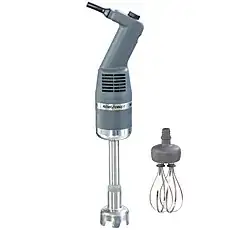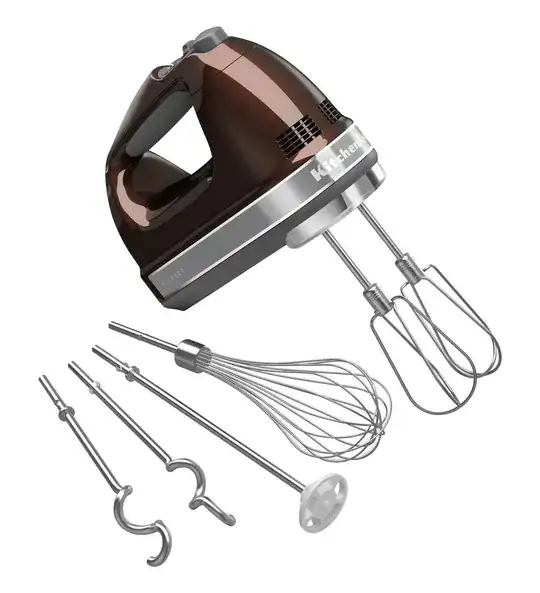After having struggled with the same problem, I am afraid that there is nothing you can look for.
What you need for kneading dough seems to be motor torque. I have never seen a hand mixer (or a stand mixer for that matter) where this parameter is given. They all just list some watt number (without even specifying if this is consumption or output, RMS or max, or any other information which would make the number comparable between brands). My current mixer has decent torque, although it is not great - I can push it through yeast doughs, and it kneads them without grinding down to single-digit RPM, but the speed still drops and it is hard work. Also, the result is not as good as kneading by hand (but this may be a problem of the two-hook-design which partly kneads and partly mixes, and not of the particular brand). I have had mixers which were unusable for dough - if you tried to push them, the dough just climbed up the hooks reaching the mixer's body. My current mixer and my last dough-unusable one are both rated at 450 Watt.
So, for torque, you are reduced to reading ratings by test associations (Cook's illustrated is good for kitchen equipment if you are shopping in the USA) and Amazon reviews. If customers say that the dough climbs up the hooks, run away from that model.
As for durability, this is up to the particular model itself, there are wide differences even within the same brand. And of course, just because some design mixers are sold with steel bodies, it doesn't automatically mean that they are more solid inside than their plastic-clad siblings.
I doubt it that you will be able to find a pro hand mixer. The most valuable commodity in a professional kitchen is time. No chef can afford to act as the stand for a hand mixer when a few hundred dollars can buy him a stand mixer (or a few thousand for a serious baker). As I have never actually shopped in a restaurant supply store, I would gladly take this back if somebody can show me a counterexample.
I don't have a specific brand recommendation for you, and outright asking for it would be off-topic here, just like on other stack exchange sites. I am afraid you will have to rely on reviews from other sources :(
Edit Most answers here say that this is not the right tool, and that professionals don't use it anyway. I agree with them. But as for the question whether you should invest in a stand mixer: it depends on what you do with it. Standard doughs in the 60% to 65% hydration are actually well doable with a hand mixer once you find a good representative of the class. The problems start when you have either drier doughs (it does not have the power to push trough them) or high-hydration doughs (it mixes trough the dough instead of kneading, so the gluten does not get aligned - especially problematic if the dough is also enriched). If you are doing standard French bread or similar, a hand mixer may well be the solution which is good enough for you. Just don't expect stellar results.

